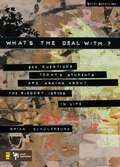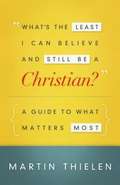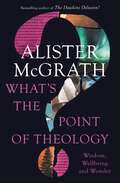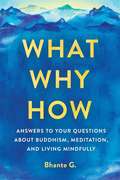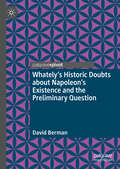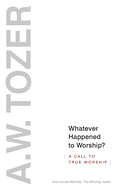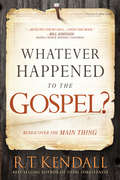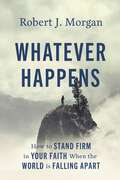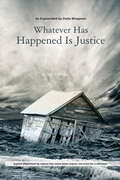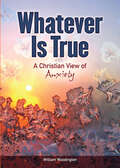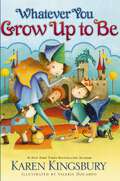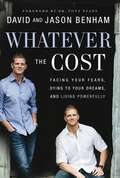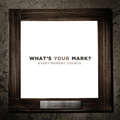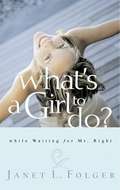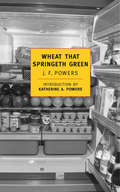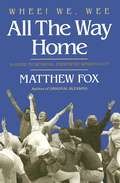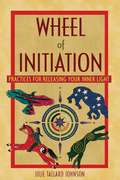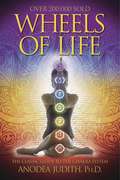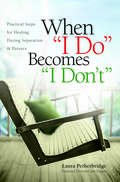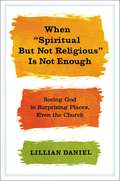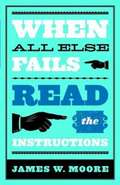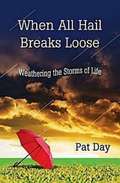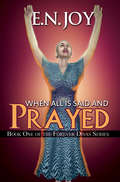- Table View
- List View
What's the Deal With …?: 500 Questions Today's Students Are Asking about the Biggest Issues in Life (Quick Questions)
by Brian SchulenburgIt was a sixteen-year-old named Charlie who first started asking Brian Schulenburg the tough questions about faith, God, and life. And since then, Brian meets every other week with dozens of students who are asking the same questions. While he doesn’t have all the answers, he’s found that just letting the students ask the questions and wrestle through them together, life change is happening. Here you’ll find 500 of those tough questions, perfect for you to use with your own students. You’ll get them thinking and talking about the things that probably confuse and bewilder them. Questions like: • What’s the deal with the Bible? How do we know that we can trust it? • What’s the deal with heaven? Will there be sex in heaven? • What’s the deal with sin? Are some sins worse than others? • What’s the deal with dinosaurs? Were there dinosaurs on the ark? • What’s the deal with tragedy? Why would God let a baby die? There may not always be a “right” answer, but there will be great discussions that lead to life change. If you’re looking for a way to get your students talking and thinking about some of the deeper issues of faith and life, What’s the Deal With… is the perfect book to keep on hand.
What's the Least I Can Believe and Still Be a Christian?
by Martin ThielenPastor and author Martin Thielen has compiled a list of ten things Christians need to believe--and ten things they don't--to be Christians. This lively and engaging book will be a help to seekers as well as a comfort to believers who may find themselves questioning some of the assumptions they grew up with. Many people in the twenty-first century hunger for an expression of Christian faith that is different from the judgmental and narrow-minded caricatures they see on television or in the news. With an accessible style that's grounded in solid biblical scholarship, Thielen shows how Christians don't need to believe that sinners will be "left behind" to burn in hell or that it's heresy to believe in evolution. And while we must always take the Bible seriously, we don't always have to take it literally. At the same time, Christians do need to believe in Jesus--his life, his teachings, his death and resurrection, and his vision for the world. Thielen articulates centrist, mainline Christianity in a way that's fresh and easy to understand and offers authentic Christian insights that speak to our deepest needs. This is an ideal book for individual, group, or congregational study.
What's the Point of Theology?: Wisdom, Wellbeing and Wonder
by Alister E. McGrathTheology is the study of the nature of God and of religious belief. But why should that matter to us?What's the point of theology?In this wonderfully accessible book, renowned theologian Alister McGrath answers that question--What's the point of theology?--and explores the depth and breadth theology can bring to our lives. Drawing on insights from his experience of coming to Christianity from atheism, this exhilarating and enlightening volume reveals how theology can help us grow in wisdom, contribute to our wellbeing, spark our innate sense of wonder, and above all, grow in faith and love as we draw ever closer to the divine. Ideal for new and seasoned Christians who want to engage more deeply with their faith, as well as those who are puzzled by spiritual matters and curious to find out more, What's the Point of Theology? will open your eyes to all that theology has to offer--a wiser understanding of what really matters, a richer vision of the good life, a deeper appreciation of the beauty of nature, and an avenue to strengthen your faith and relationship with God.
What, Why, How: Answers to Your Questions About Buddhism, Meditation, and Living Mindfully
by Bhante GunaratanaEverything you ever wanted to know but never had a chance to ask about meditation and Buddhist spiritual practice, from one of the greatest mindfulness teachers of our time.How can I fit meditation into my busy life? How should I understand karma and rebirth? Is enlightenment even possible for me? Sound familiar? If you&’ve ever meditated or studied Buddhism, you may have found yourself asking these questions—and many more! Here&’s the good news: there are answers, and you&’ll find them all in this book. Imagine that you could sit down with one of Buddhism&’s most accomplished and plainspoken teachers—and imagine that he patiently agreed to answer any question you had about meditation, living mindfully, and key Buddhist concepts—even the myriad brilliant questions you&’ve never thought to ask! What, Why, How condenses into one volume a half-century of Bhante G.&’s wise answers to common questions about the Buddha&’s core teachings on meditation and spiritual practice. With his kind and clear guidance, you&’ll gain simple yet powerful insights and practices to end unhealthy patterns and habits so that you can transform your experience of the world—from your own mind to your relationships, your job, and beyond.
Whately's Historic Doubts about Napoleon's Existence and the Preliminary Question
by David BermanThis book examines Richard Whately's classic book Historic Doubts Relative to Napoleon Buonaparte. After considering its textual development, the analysis focusses on Whately's idea of the &‘Preliminary Question&’; the idea that in the debate about Jesus&’s miracles there is a more basic question that has been overlooked and which invalidates the debate. It is asked whether the notion of a Preliminary Question might not illuminate other philosophical disputes. Finally, a variant of the Preliminary Question is proposed in which both positions in a dispute are shown to be true and this form of the question is invoked to shed light on the debate between metaphysical monists and dualists and to revisit the debate about miracles. This book is essential reading for all scholars of the philosophy of religion and British 19th century philosophy. It is also of interest to scholars researching David Hume and Bertrand Russell.
Whatever Happened to Worship?: A Call to True Worship
by A. W. TozerA.W. Tozer calls God the "Composer of the Cosmos," the "Chief Musician of the Universe." God signals the birds to chirp their beautiful tune in the coolness and tranquility of a spring morning, simply because that is what He designed them to do. Each note is wonderfully constructed by God, uniquely bringing praise to His name. With this inspiring perspective on worship, Tozer invites readers to take a deep look at the ways in which we worship and why. He reminds us that we were created solely for this purpose and that worshipping the Father and seeking His fellowship is our primary task. It is also His delight. The newest revised edition now includes "Worship: The Missing Jewel of the Evangelical Church," first published in the Alliance Life magazine in 1965, and still so profound today.
Whatever Happened to Worship?: A Call to True Worship
by A. W. TozerA.W. Tozer calls God the "Composer of the Cosmos," the "Chief Musician of the Universe." God signals the birds to chirp their beautiful tune in the coolness and tranquility of a spring morning, simply because that is what He designed them to do. Each note is wonderfully constructed by God, uniquely bringing praise to His name. With this inspiring perspective on worship, Tozer invites readers to take a deep look at the ways in which we worship and why. He reminds us that we were created solely for this purpose and that worshipping the Father and seeking His fellowship is our primary task. It is also His delight. The newest revised edition now includes "Worship: The Missing Jewel of the Evangelical Church," first published in the Alliance Life magazine in 1965, and still so profound today.
Whatever Happened to the Gospel?: Rediscover the Main Thing
by R.T. KendallLet&’s Get Down to the Truth You know the &“prosperity gospel.&” The &“name it and claim it gospel.&” The "political gospel". The messages being preached on at least 90 percent of religious television. But what about the Gospel? What was it the apostle Paul was &“unashamed&” of? Most Christians don&’t understand what the true Gospel of Jesus is. In our church sanctuaries pastors neglect to preach the fear of God and eternal punishment. Church communities have grown to believe that all are saved and none will be lost. Meanwhile many other Christians lack assurance of their own salvation and focus on sanctification as their only ticket to Heaven. They ignore what was historically introduced by Jesus, filled out by the apostle Paul, and articulated by the sixteenth-century Reformers. The Gospel has been brushed to one side, and evidence of this is seen in how churches are misleading and even mistreating people.IT'S TIME TO BRING BACK WHAT IT REALLY MEANS TO BE SAVED. Respected author and theologian R. T. Kendall sounds a wake-up call for churches across the globe. Whatever Happened to the Gospel? seeks to reacquaint you with the Gospel and reignite a passion in your heart to know more of God.
Whatever Happens: How to Stand Firm in Your Faith When the World Is Falling Apart
by Robert J. MorganDo you struggle keeping your faith in a world that's losing its mind? These 31 short chapters take a deep dive into the book of Philippians, which Robert Morgan says is the Bible's handbook for tackling each day with an undaunted attitude.Life is unpredictable, and the world is unstable. People have never been so confounded, sensing our culture, economy, and geopolitical systems are spiraling downward. Even in our personal lives, none of us knows what will happen next—which is why God gave us the book of Philippians. This short letter—just over 100 verses—can help us learn to live overflowing lives in an overwhelming world.Philippians is one of the most practical books of the Bible, which Robert Morgan says is as fresh as ever. Its theme can be summed up in these verses: "Whatever happens, conduct yourself in a manner worthy of the gospel of Christ. Then . . . I will know that you stand firm in the one Spirit, striving together as one for the faith of the gospel without being frightened in any way by those who oppose you" (1:27–28). Among the many lessons in Whatever Happens, readers will learn how to:Use prayer to energize their lifeMake today about othersStay as cheerful as possible in all circumstancesLet others lean on their strengthStart everything with praise and end everything with prayer As the apostle Paul wrote his letter to the Philippians from a prison cell, he was facing dire circumstances and an unsettled future. Would he be released or executed? But he knew one thing—that whatever happened, he was going to stand firm in his faith and live a life worthy of the gospel. And no matter what we are going through today, we can do the same.
Whatever Has Happened Is Justice
by Dada BhagwanThere are times in life when we must endure suffering due to no fault on our part – or so it seems. Life circumstances can appear terribly unjust. Naturally we question, “Why me? Am I wrong? It’s not my fault!, Why do bad things happen to good people?” Added to the many problems in everyday life, these situations can feel like the very definition of suffering. We may conclude that there is no God, question how to get inner peace, and how to live through such trying circumstances. In the book “Whatever Has Happened Is Justice”, Gnani Purush (embodiment of Self knowledge) Dadashri offers spiritual guidance on how to resolve conflict of injustice inherent in life. Dadashri provides profound insight into the law of karma, explaining who is “The Doer”, who is at fault, and what is the cause behind every instance of suffering. To attain an inner state of no worry, to begin to live in peace, or even to learn how to stay healthy amidst life challenges, this book will prove precious.
Whatever Is True: A Christian View of Anxiety
by William WoodingtonHow do I relieve my anxiety? For Christians struggling with anxiety, Bible passages that say, "Don't be anxious about anything," or, "Do not worry," may feel more challenging than comforting. Does God not understand that anxiety isn't something that you can just stop? Of course not. God knows the struggles his people are facing—he knows the struggles you are facing. Then how are we supposed to understand these Bible passages? How are we supposed to handle and relieve anxiety? What's the solution? While books on anxiety and mental health can be found in any store, many of them tell readers to help themselves. Author William Woodington, a sufferer of chronic anxiety, takes a different approach to handling anxiety by reminding believers that all of their help comes from the Lord. Whatever Is True will equip you with numerous Bible passages to help you face and handle your anxiety with the comforting truth of the gospel. Armed with a new perspective on suffering and filled with the assurance of God's love, you will discover an unending source of peace, comfort, and strength through this book.
Whatever You Grow Up to Be
by Karen Kingsbury“Ten little toes right from the start Make footprints on your mommy’s heart!” The timeless journey of a mother and son is poignantly captured in the story of a boy’s growth from childhood to fatherhood. From birth to football games to college graduation, a mother reminds her son that life is filled with possibilities and that God has a plan for him—whatever he grows up to be!
Whatever the Cost: Facing Your Fears, Dying to Your Dreams, and Living Powerfully
by Tony Evans Scott Lamb Jason Benham David Benham"Two nationally-acclaimed real estate entrepreneurs share biblical principles to revolutionize your work and family life, and give you the courage to stand up for what is right." This book follows the story of highly motivated and entrepreneurial twin brothers, David and Jason Benham, from their formative years and ventures into professional baseball to their rise as owners of a multi-million dollar business empire and securing an HGTV reality series. It's a journey where the brothers learned how they must die to their dreams not just once, but twice as they walked away from baseball before being called up to the Big Show and later as their TV series was stripped away from them just before airing when the network succumbed to media pressures surrounding their faith. These experiences only helped them realize that the key to powerful living is found when you die to your dreams and face your fears, and choose to live powerfully through it all. The biblical principles they implemented to guide their work and families are revealed in practical terms to apply to our daily lives and give us courage to stand for what is right. The book will expand on principles such as: Show that You are Faithful in Little Be a Fountain to Others and not a Drain Produce More in Value than You Receive Work to Your Ability and not Your Pay Breathe Life into All Situations Remember that You are Human Beings, not Human Doings Hold to a Standard of Disciplined Living Don't Swing at Every Pitch Find Your Greatest Blessings on the Other Side of Your Greatest Fears
What’s Your Mark?
by Jeremy CowartWho was Jesus? What was his story? What mark did he leave? What's your story? What will be your mark?Join celebrity photographer and social artist Jeremy Cowart as he presents 16 compelling stories of people who are making their mark today. Their stories are just a sampling of the stories that all followers of Jesus can tell—stories from those in all walks of life whose inspiration is rooted in the truths found in the Gospel of Mark. And you’ll be inspired to make your mark—whether through your occupation, your talents or your selfless love and giving to others. Your mark may be teaching children at a school or at home, helping the homeless, or providing food to the hungry. Your mark might be an accidental mark, a reluctant mark, or an intentional mark. Whatever your mark, you’ll be inspired by the stories inside this new ebook What’s Your Mark?Become a mark-maker today, and make every moment of your life count.This ebook includes:• 112 full-color pages of Scripture, stories, and photography by renowned photographer Jeremy Cowart• 16 photos and stories of people—some names you’ll recognize, others not so well known—making their mark• Scripture text of the Gospel of Mark from the bestselling New International Version (NIV) Bible
What’s a Girl to do?: While Waiting for Mr. Right
by Janet L. FolgerSingle people could very well be the most effective members of God's kingdom, so Satan gets them to believe they're forsaken by God. But it's a lie. Janet Folger says: "You're alone now, like me, because God has something critically important He wants you to do right now. " This is an honest, encouraging, and hilarious chat with a woman who knows single people's struggles. Folger's witty insights will clear readers' minds of the lies that destroy their happiness and freedom as single women - all the sooner to find what God has for them to do right now. Things to Do with Your Ex-Boyfriend’s Shirt: A. Return it cleaned and pressed in time for his next date. B. Sew it into a pillow to cry on. C. Use it to clean out the crud in your refrigerator. If you chose option C, this book is for you. With quick wit and refreshing honesty, Janet Folger will make you laugh and cry, sparing you the usual Christian singles saccharine. Enjoy a fun and lively chat with a girl who knows your struggles. “You’re alone now-like me,” Janet says-“because God has something critically important He wants you to doright now. ”You’ll be encouraged as you pursue the rich, surprising life God made you for. Story Behind the Book Writing a book about dating just isn’t my thing. Not my area of expertise. Not my focus. But then I started thinking about it. Maybe I have learned some things. Maybe I could add something useful to the mix that hadn’t been said already. So I emailed my agent to say I would consider it. Then I broke up with my boyfriend. When my agent telephoned to ask why I hadn’t responded to his emails, the call went something like this: “You can forget about the book. I can’t even write a pamphlet. How in the world am I supposed to give advice when I can’t handle my own love life?” In his pep talk, my agent told me the thing I have going for me is honesty. He told me to picture myself in a coffee shop catching up with friends, trading stories, binding each other’s wounds, laughing, refocusing, and re-emerging as the women God wants us to be. So I did. From the Trade Paperback edition.
Wheat That Springeth Green
by Katherine A. Powers J. F. PowersWheat That Springeth Green, J. F. Powers's beautifully realized final work, is a comic foray into the commercialized wilderness of modern American life. Its hero, Joe Hackett, is a high school track star who sets out to be a saint. But seminary life and priestly apprenticeship soon damp his ardor, and by the time he has been given a parish of his own he has traded in his hair shirt for the consolations of baseball and beer. Meanwhile Joe's higher-ups are pressing for an increase in profits from the collection plate, suburban Inglenook's biggest business wants to launch its new line of missiles with a blessing, and not all that far away, in Vietnam, a war is going on. Joe wants to duck and cover, but in the end, almost in spite of himself, he is condemned to do something right.J. F. Powers was a virtuoso of the American language with a perfect ear for the telling clich? and an unfailing eye for the kitsch that clutters up our lives. This funny and very moving novel about the making and remaking of a priest is one of his finest achievements.
Whee! We, Wee All the Way Home: A Guide to Sensual Prophetic Spirituality
by Matthew FoxThis practical book leads us into a spirituality of passion that leads to compassion--coming to our senses in every meaning of the phrase.
Wheel of Initiation: Practices for Releasing Your Inner Light
by Julie Tallard JohnsonA guide to personal spiritual initiation through the transformation of habitual patterns, apathy, and resistance • Based on the Native American medicine wheel, the Vedic wheel, and the universal initiatory mandala • Enables readers from any tradition to initiate themselves through practices of thought transformation, narrative medicine, meditation exercises, rituals, and journaling • Facilitates breaking through personal and societal illusions that perpetuate resistance and apathy Intentions and spiritual principles, meditation and contemplation, ritual, and risk-taking are the conditions that comprise an initiated life. Regrettably, in modern society we do not have rites of initiation that break through the personal and societal illusions that instill and perpetuate negative habits that keep us in states of resistance. Lacking initiation practices, we often remain trapped in ways of being in the world that were formed by our past conditions and attachments. We tend to identify too strongly with the status quo, which must be challenged to prevent stagnation and to encourage happiness and authenticity. Julie Tallard Johnson shows how to become initiated into an authentic life through practices of thought transformation, cultivating attention, journaling, storytelling, and rituals found in the four directions of the universal mandala. She begins the Wheel of Initiation in the South, where initiates set their intentions; then moves into the West, where they free themselves from habitual patterns and core beliefs; then into the North, the direction of cultivating attention and unity; and finishes in the East, the direction of regeneration and initiation. Drawing upon the life experiences of those who have successfully navigated the wheel, Johnson demonstrates that once fears, assumptions, and ingrained beliefs are confronted and transformed, initiates emerge ready to reenter society with renewed energy and vision that will enrich their own lives and their communities.
Wheels Of Life: A User's Guide To The Chakra System
by Anodea JudithAs portals between the physical and spiritual planes, the chakras offer unparalleled opportunities for growth, healing, and transformation. Anodea Judith's classic introduction to the chakra system, which has sold over 200,000 copies, has been completely updated and expanded. It includes revised chapters on relationships, evolution, and healing, and a new section on raising children with healthy chakras. Wheels of Life takes you on a powerful journey through progressively transcendent levels of consciousness. View this ancient metaphysical system through the light of new metaphors, ranging from quantum physics to child development. Learn how to explore and balance your own chakras using poetic meditations and simple yoga movements--along with gaining spiritual wisdom, you'll experience better health, more energy, enhanced creativity, and the ability to manifest your dreams.
When "I Do" Becomes "I Don't"
by Laura PetherbridgeWhen Laura Petherbridge realized her marriage was ending, she asked the gut-wrenching question,"What do I do now?"Now Laura offers practical answers about divorce that she has found through her own experience and through two decades of caring for those grieving the loss of a marriage. In the midst of pain and confusion, you might also be asking questions such as these: How do I find where I belong when I no longer know my identity? If my spouse asks for forgiveness, should I go back? If I get an attorney, will my spouse think I'm giving up on our marriage forever? How do I figure out a budget on my own? What should I do when others criticize my ex-spouse in front of my kids? How do I reenter the workplace after years of staying home? How will I know when it's a good time to date again? Does God still care about me? Will I ever be happy again? With straightforward, sensitive answers to these questions and others, Petherbridge offers real-life help, spiritual insights, and new hope for the future.Includes reflection and discussion questions after each chapter and guidelines for those who love someone who is getting a divorce.
When "Spiritual but Not Religious" Is Not Enough: Seeing God in Surprising Places, Even the Church
by Lillian DanielThe phrase "I'm spiritual but not religious" has become a cliché. It's easy to find God amid the convenience of self-styled spirituality--but is it possible (and more worthwhile) to search for God through religion?Minister and celebrated author Lillian Daniel gives a new spin on church with stories of what a life of faith can really be: weird, wondrous, and well worth trying. From a rock-and-roller sexton to a BB gun-toting grandma, a church service attended by animals to a group of unlikely theologians at Sing Sing, Daniel shows us a portrait of church that is flawed, fallible--and deeply faithful. With poignant reflections and sly wit, Daniel invites all of us to step out of ourselves, dare to become a community, and encounter a God greater than we could ever invent. Humorous and sincere, this is a book about people finding God in the most unexpected of places: prisons, airports, yoga classes, committee meetings, and, strangest of all, right there in church.
When All Else Fails...Read the Instructions with Leaders Guide: Read the Instructions
by James W. MooreJim Moore takes a close look at three sections of the Bible which dramatically underscore key "instructions" for living:1. Instructions for Meaningful Living - The Beatitudes2. Instructions for Moral Living - The Ten Commandments3. The Bottom Line Instruction - The New Commandment of Jesus, "Love One Another"
When All Hail Breaks Loose: Weathering the Storms of Life
by Pat DayStorms can come suddenly, unexpectedly, and catastrophically. We are never the same after suffering the shock and after-shocks of such earth-shattering experiences. And it is during these times that we need the assurance that only our faith in God provides. When All Hail Breaks Loose offers practical, proven life strategies for not only surviving, but also thriving, in the midst of major life challenges. When we are going through a storm, we can’t help but wonder: How does my faith help me when everything is falling apart? How does trusting God in prayer really make a difference? Where can I turn to receive the strength and direction that will help me hold my life together when everything is coming apart? Where is God in the midst of my suffering and pain? How can I make it through the long nights of fear, doubt, and uncertainty? How can I keep going when everything in me wants to quit? God provides the resources to weather life’s storms: faith, prayer, friends and family, courage and fortitude, and the determination to persevere. It is reassuring to know the battle is not ours but God’s.
When All Is Said and Prayed: Book One of the Forever Diva Series (Forever Divas #1)
by E. N. JoyIt ain't easy being saved, sanctified, and single. Try being a once divorced, now widowed single mother of two on top of that. Thank God the Lord built Paige Vanderdale to be able to bear all of those titles without becoming weary to the point of giving up. From the outside looking in, that life looks good on her. On the inside, though, Paige is coveting what so many others around her seem to have, which is true love.In the past, everything that she thought was love was either something far from it, or was taken away from her. Now Paige is afraid to let her hair down and open herself up to love again.Paige struggles with the decision to reach out to an old flame to rekindle their spark. When the blaze gets too high, will Paige do what she always does, which is grab the nearest fire extinguisher and try to put it out? Or will she utilize her backup plan and run? The decision is abruptly removed from Paige's hands when something else begins to pull her away--something that just might be the thing that finally breaks her.
When Angels Fight: My Story of Escaping Sex Trafficking and Leading a Revolt Against the Darkness
by Leslie F. KingAs seen on The Today ShowWhen she was fifteen years old, Leslie King ran away from an abusive home, looking for a better life and longing for real love. What she found instead was a man who wooed her just long enough to trap her in a life of prostitution. She became one of the many thousands of trafficked individuals in the United States, a number that continues to rise--in the biggest cities and in the most idyllic towns.As is true for so many in similar situations, life was nothing but brokenness and pain for Leslie. After years of hopelessness, she finally decided to take her own life. And then God spoke. With his promise that he was with her and had mighty things for her to accomplish ringing in her ears, she got off the streets, got clean, and got to work on the mission to which he'd called her.Now Leslie is a passionate and heroic advocate for other trafficked women and teenage girls in her community and across the country.More than a gritty, no-holds-barred deliverance story, When Angels Fight includes powerful advice from Leslie and those she's encountered in her work--police officers, judges, and other advocates and activists. She also shows you what YOU can do to make a real difference in your own community. Her call from God includes marshaling others to the cause and equipping them to fight alongside her and the angels who battle for God's children--just as they once fought for her.
